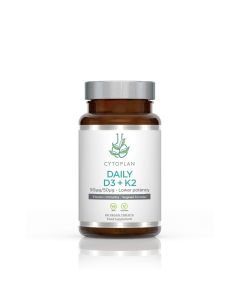What is vitamin D3?
Vitamin D3 (cholecalciferol), is a fat-soluble vitamin, made by the action of UVB sunlight on the skin. In the UK, Caucasian adults need around 13 minutes of midday sunlight exposure in summer to maintain healthy levels of vitamin D. People with darker skin have more melanin to protect their skin from sun damage, and as such, would need to spend anywhere between 30 minutes to 3 hours in the sun to produce sufficient D3.
Why do I need to take a vitamin D3 supplement?
In the UK, sufficient UVB for vitamin D synthesis only occurs on sunny days, from around 10.00 to 15.00, April to September. Over the winter months vitamin D levels typically fall by around 50%!
Some food sources, such as oily fish, liver, eggs, and mushrooms provide a very modest amount of vitamin D, but taking a vitamin D supplement, particularly throughout the winter months can be an effective way to prevent deficiency.
In the UK, vitamin D deficiency is extremely common, and you are at higher risk of deficiency, if you fall into one of the following groups:
- Those over the age of 65
- Infants and children aged 5 and below
- Pregnant or breastfeeding mothers
- Those with darker skin
- Obese and overweight people
- Those who are housebound or work night shifts
- People who cover most of their skin when outside
Vitamin D is considered to be deficient if levels are below 29nmol/l. However, optimum levels are suggested to be greater than 125nmol/L.
- Optimal - 125-199 nmol/L
- Sufficient - 75-124 nmol/L
- Low - 30-74 nmol/L
- Deficient - less than 29 nmol/L
If you are unaware of your Vitamin D levels or fall into one of the "at risk" categories, then it may be beneficial to get your vitamin D levels tested so you can ensure that, where needed, you take the appropriate dosage of vitamin D tablets to achieve optimal levels and better health outcomes.
Benefits of vitamin D
Historically seen as a vitamin to support bone health, vitamin D's essential role in supporting immunity is also now becoming well known, but it in fact has a far-reaching impact upon all of the following areas of health:
- Bone health - vitamin D plays an essential role in supporting healthy bone density and deficiency is related to an increased risk of osteoporosis and osteomalacia as well as specifically leading to rickets, particularly in children.
- Immune health - vitamin D has the ability to directly modulate our immunity. Deficiency in vitamin D is associated with increased autoimmunity as well as an increased susceptibility to infection.
- Hormonal health - as a hormone, vitamin D also can elicit significant influence over other areas of the endocrine system. Adequate vitamin D levels can support both male and female fertility.
- Cardiovascular health - low vitamin D levels have been associated with an increased risk of conditions such as cardiovascular disease and high blood pressure.
- Mood - vitamin D can have a positive effect on both mood and sleep.
- Skin - vitamin can play an important role in skin tone, as well as providing anti-inflammatory benefits in conditions such as acne and eczema.
- Women's health - vitamin D can support healthy bone density following the menopause and can help regulate menstrual disorders such as premenstrual syndrome.
- Men's health - vitamin D can support muscle growth and development and plays an important role in male fertility.
What is the recommended vitamin D daily dose?
All our vitamin D supplements provide vitamin D as D3, or cholecalciferol, which appears to be more effective at increasing our vitamin D levels than D2.
The current UK NRV is currently 5μg (200iu) per day, but emerging evidence shows that we need more than this for optimal health. The Department of Health recommends that adults and children over the age of 1 should have 10μg (400iu) a day, and breastfed babies should be given a daily supplement of vitamin D (8.5-10mcg). We offer vitamin D3 drops for babies that are suitable from birth.
Our selection of vitamin D supplements include a vegan wholefood vitamin D3 tablet, vitamin D3 drops, suitable from birth but great for all the family, and vitamin D3 and K2 capsules, at either a high potency or daily dosage.
What is the different between D2 and D3?
What are the benefits of taking Vitamin D?
How much vitamin d3 should I take daily?
Should I take vitamin K2 with vitamin D?








